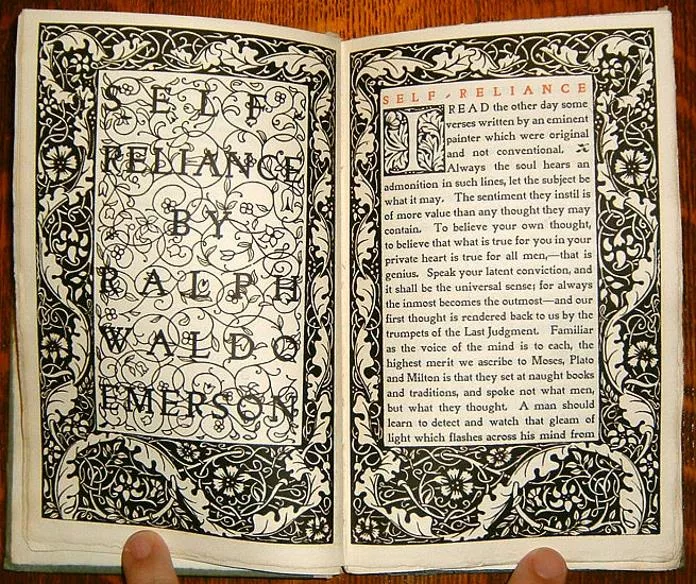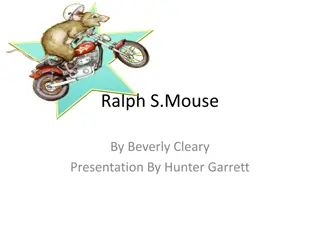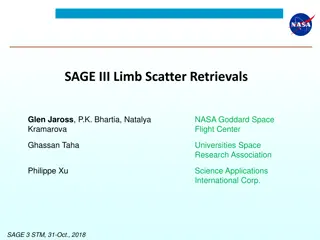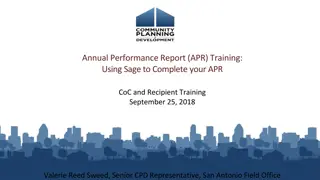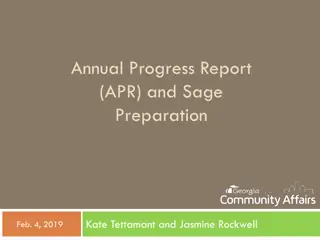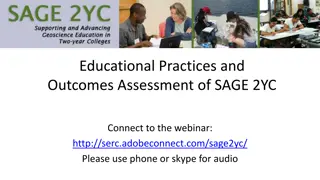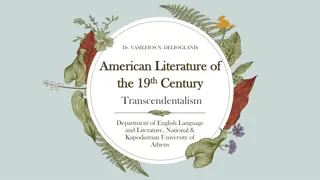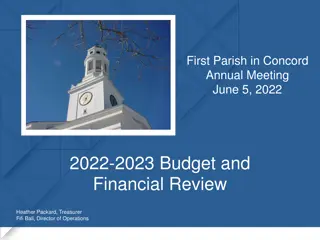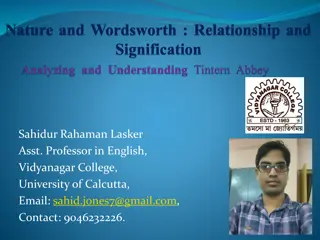Ralph Waldo Emerson: The Sage of Concord and Transcendentalism
Ralph Waldo Emerson, a key figure in the transcendentalist movement, advocated self-reliance, spiritual independence, and nonconformity. He emphasized individualism, belief in oneself, and living in harmony with nature. Emerson's philosophy of transcendentalism shaped his famous essay "Self-Reliance," where he encouraged people to trust their own instincts and convictions. His life, marked by personal tragedies and intellectual pursuits, reflected his belief in the power of the human spirit and the importance of self-discovery.
Download Presentation

Please find below an Image/Link to download the presentation.
The content on the website is provided AS IS for your information and personal use only. It may not be sold, licensed, or shared on other websites without obtaining consent from the author. Download presentation by click this link. If you encounter any issues during the download, it is possible that the publisher has removed the file from their server.
E N D
Presentation Transcript
Ralph Waldo Emerson Self-Reliance
Emersons Biography: The Sage of Concord 1803- Ralph Waldo Emerson born on May 25 in Boston. 2nd of 5 boys. 1817-1821-Attends Harvard College. 1829-Ordained junior pastor of Boston s Second Church. In July of the same year was named a pastor. 1831-Wife Ellen Tucker Emerson dies of tuberculosis on Feb. 8. Faces spiritual crisis. 1832- On December 22, renounces pastorate and sails for Europe. 1833- Returns from Europe and delivers a lecture on The Uses of Natural History before Natural History Society in Boston. 1835- Marries Lydia Jackson of Plymouth and moves to rural Concord where his family has property. 1836-Publishes first book Nature. 1837-8-Addresses Harvard s Phi Beta Kappa Society on the American scholar and the Divinity School s graduates on Christianity.
Emersons Biography Contd 1840- Editor of The Dial 1842- Son Waldo dies at the age of 5 from which he does not recover. 1844- Son s death pushes him to write his essay titled Experience. Publication of the The Dial ends. Emancipation of the Negroes in the British West Indies delivered at the Concord Court House on Aug. 1 1847-48-Second trip to Europe. Lectures in England and Scotland. 1855- Lecture on Slavery presented before the Massachusetts Anti-Slavery Society at the Tremont Temple in Boston. Spoke before the Woman s Rights Convention to support the woman s right to vote. 1856- Publishes English Traits 1873-Fire damages his house. Travels to Europe and Egypt with daughter Ellen and meets with Thomas Carlyle one last time. 1882-Dies in April 27.
Transcendentalism According to Emerson Emerson's Philosophy of Transcendentalism Emerson formulated the philosophy of transcendentalism or in simple terms, an idealist who advocated self-reliance, spiritual independence, and who rejected traditional authority. He is famous for the often-quoted: "Make the most of yourself, for that is all there is of you." Emerson believed that people should rely on their reason to learn what is right and should try to live a simple life in harmony with nature and with others. "The Transcendentalist adopts the whole connection of spiritual doctrine. He believes in miracle, in the perpetual openness of the human mind to new influx of light and power; he believes in inspiration, and in ecstasy. He wishes that the spiritual principle should be suffered to demonstrate itself to the end, in all possible applications to the state of man, without the admission of anything unspiritual; that is, anything positive, dogmatic, personal. Thus, the spiritual measure of inspiration is the depth of the thought, and never, who said it? And so he resists all attempts to palm other rules and measures on the spirit than its own....
Themes and Style in Self-Reliance Individualism Nonconformist Childhood Innocence Bold Youth Inconsistency Believe in yourself Believe in your own convictions Self-Helping Man No outside help Nature Human Nature (soul, spirit, etc.) Nature (plants, sea, etc.) First POV I, We, Us Second POV You Third POV He Man
What pretty oracles nature yields us on this text in the face and behavior of children, babes, and even brutes (Emerson 534). Theme: Unconformity Children Babies Youth Young minds have not been influenced by society as much as adults. Their mind is untainted by facts or harsh realities. They say exactly what is on their mind without worry of consequence. POV: First Person
Whoso would be a man must be a nonconformist (Emerson 535). Theme: Unconformity What have I to do with the sacredness of traditions, if I live wholly from within? my friend suggested- But these impulses may be from below, not from above. I replied, They do not seem to me to be such; but if I am the devil s child, I will live then from the devil (Emerson 535). POV: Third Person
A foolish consistency is the hobgoblin of little minds, adored by little statesmen and philosophers and divines. With consistency a great soul has simply nothing to do (Emerson 537). Theme: Inconsistency Consistency is boring, so do something new. Say the unexpected. To be great is to be misunderstood. POV: Third Person
Man is timid and apologetic. He is no longer upright. He dares not say I think, I am, but quotes some saint or sage. He is ashamed before the blade of grass or the blowing rose. These roses under my window make no reference to former roses or to better ones; they are for what they are; they exist with God to-day. There is no time to them (Emerson 541). Theme: Nature Human Nature Rose Reference Man is unsure of what he believes and he would rather talk through someone else. The past and the future have no say in the present. POV: Third Person
Welcome evermore to gods and men is the self-helping man (Emerson 545). Theme: Self-Help Man It is better to avoid any kind of help from others. Your actions will be celebrated more because you did them by yourself. You gotta do what you gotta do, no outside input needed. POV: Third Person
Nothing can bring you peace but yourself. Nothing can bring you peace but the triumph of principles (Emerson 550). Theme: Believe in yourself. Luck has nothing to do with it, but what you live by (morals) does. You write your own destiny, predict your own future. No fate but what we make. POV: Second Person










